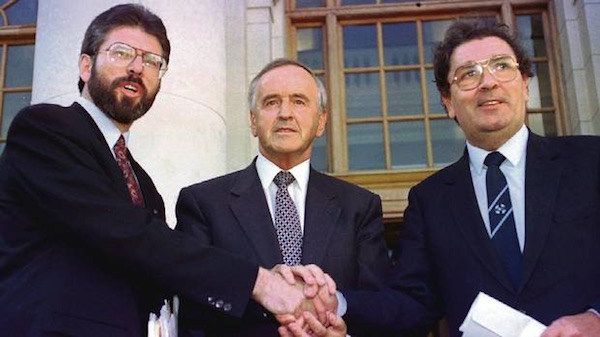
A famous public handshake by the late 26 County Taoiseach Albert Reynolds with the Sinn Féin president Gerry Adams and the SDLP leader John Hume in Dublin was designed “to tie Adams into a process from which he personally would not be able to escape”, according to previously classified British government files released this week in Belfast.
The famous gesture came in 1994, just a week after the announcement of the ceasefire by the Provisional IRA.
In a memo on developments in the peace process, dated October 6, 1994, Chris MacCabe of the Political Affairs Department of Britain’s Northern Ireland Office told ministers and officials: “Albert Reynolds gratefully and unquestioningly accepted the PIRA ceasefire as permanent.
“His subsequent meeting with Gerry Adams and John Hume was widely believed to reflect indecent haste although clearly designed to tie Adams into a process from which he personally would not be able to escape, no matter what the republican movement did.”
Mr MacCabe continued: “Irish irritation at [the British government’s] refusal to acknowledge the permanency of the IRA’s ceasefire also demonstrated itself by early calls for a relaxation of security policy in Northern Ireland and hints that IRA prisoners might be released early.”
In the official’s view, “relief mingled with scepticism characterised the initial response of the unionist community”.
There was immediate concern that “a secret deal had been struck’ to bring Sinn Féin into the process”. However, a speech by the British prime minister, John Major on September 16, 1994 “had done much to allay unionist fears”.
Following the ceasefire, Britain’s attention turned to disarming the Provisionals.
The then British Direct Ruler Patrick Mayhew said he was optimistic about the possibility of a permanent peace according to a private letter written by him in another file declassified in Belfast.
In a letter dated December 29, 1994, Mayhew wrote: “Peace has broken out, I hope permanently, and for the first time in twenty-five years we are harbouring more than a lingering hope the violence is over for good. The atmosphere has been transformed.”
“However,” Mr Mayhew added, “all the paramilitary structures (including armaments) remain in place”.
He acknowledged that there had been “some rumblings about the ceasefire” in the republican movement but he felt that the overtures of the leadership offered hope of permanent peace.
“The republican leadership having intentionally built bridges with the Irish and American governments and the SDLP, there are some grounds for optimism that the peace can be made to last if we can circumvent the obstacle of the weaponry,” he wrote.
![[Irish Republican News]](https://republican-news.org/graphics/title_gifs/rn.gif)
![[Irish Republican News]](https://republican-news.org/graphics/title_gifs/harp.gif)

